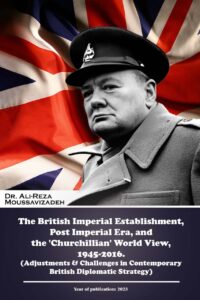British Diplomatic Oil Crisis: Contemporary Anglo-Saxon Geopolitical Rivalries in the Persian Gulf: Drawing a Lesson? Or Sir Anthony Eden‘s Delusion of Grandeur.
operation
with the CIA. Woodhouse, together with several Foreign
Office officials, immediately went to Washington. He sensed that the
Americans, for their part, did not reject the idea of a joint
operation against Musaddiq. The CIA indicated that it was prepared
to discuss the case further. C.M. Woodhouse continued with his
planning until the American Presidential election was over. The
British policy was now, according to Sir Pierson Dixon, ‘to play the
hand along until we can sound out the attitude of General
Eisenhower’s Administration to the Persian oil problem.’
31 By the time Dwight D. Eisenhower won the
Presidential election in November 1952, Woodhouse had completed
the process of undercover planning. Eisenhower’s winning the
election opened for the CIA the prospect of leadership more
active than Truman’s.
As was
explained earlier in this chapter, Musaddiq by 1953 was
losing support among his allies, and receiving the backing of the
Tudeh party (the Communist party in Iran). The uncompromising
position that Musaddiq took, which the previous chapter showed, fear
of communist influence in Iran, the support that in 1953 Musaddiq
was getting from the Tudeh party, and the Soviet challenge, made
America alter its policy from diplomacy to intervention. The United
States Government saw Musaddiq by now as too destabilising to let
him stay in power and that his overthrow would be the solution to
the crisis. The new Republican administration of Dwight Eisenhower
was concerned about the communist takeover in Iran, and access to
the rich Iranian oil reserves by the West was its worry. Eisenhower
came round to the view that the answer to the crisis was
intervention and toppling of Musaddiq’s government. This decision
was also encouraged by the winding down of the Korean War, and more
western manpower was available. On both sides of the Atlantic
conservatives were in power. Additionally, both the British and
American administrators, which was pointed out in Chapter Four of
this thesis, thought nationalism was too dangerous
31. Ibid, p. 251.
Pages: 1 2 3 4 5 6 7 8 9 10 11 12 13 14 15 16 17 18 19 20 21 22 23 24 25 26 27 28 29 30 31 32 33 34 35 36 37 38 39 40 41 42 43 44 45 46 47 48 49 50 51 52 53 54 55 56 57 58 59 60 61 62 63 64 65 66 67 68 69 70 71 72 73 74 75 76 77 78 79 80 81 82 83 84 85 86 87 88 89 90 91 92 93 94 95 96 97 98 99 100 101 102 103 104 105 106 107 108 109 110 111 112 113 114 115 116 117 118 119 120 121 122 123 124 125 126 127 128 129 130 131 132 133 134 135 136 137 138 139 140 141 142 143 144 145 146 147 148 149 150 151 152 153 154 155 156 157 158 159 160 161 162 163 164 165 166 167 168 169 170 171 172 173 174 175 176 177

